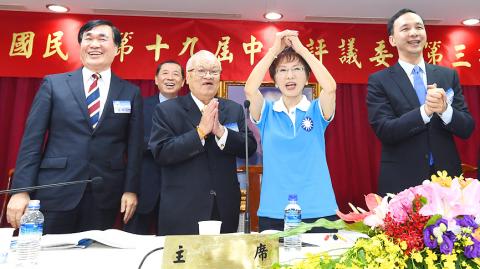New Taipei City Mayor Eric Chu (朱立倫) yesterday urged people to vote to keep the Chinese Nationalist Party (KMT) in power in next year’s presidential and legislative elections, saying it is the key to laying the foundation for the nation’s continued economic prosperity and for peace across the Taiwan Strait.
The KMT chairman said that the nine-in-one elections in November last year were a major setback for the party, but the party would not be defeated in one battle.
The KMT is capable of self-reflection, and temporary setbacks are an incentive for the party to step back into the ring, Chu told a party meeting with KMT vice chairpersons Hau Lung-bin (郝龍斌) and Huang Min-hui (黃敏惠) as well as KMT presidential candidate Hung Hsiu-chu (洪秀柱).

Photo: Liu Hsin-de, Taipei Times
In response to media comments to: “Give us a reason why the KMT should continue to exist,” Chu said he could think of at least three reasons for its continued existence and why it should remain in power.
The KMT is trustworthy and has not used ethnic conflict to create social turmoil for its own political advantage, Chu said.
Having the KMT remain in power is the only way Taiwan can continue to prosper, with the party guiding the nation through the many economic challenges of the 21st century, he said.
The last and most severe challenge that only the KMT can resolve is its “appropriate” handling of cross-strait issues and maintaining steady development of cross-strait relations, Chu said.
Over the past eight years, the Democratic Progressive Party (DPP) has continued to promote cross-strait conflict, endangering the peace that has been achieved over this period, Chu said.
He added that only with the KMT at the helm of the nation can there be a lasting foundation for stable development of the nation’s economy and cross-strait relations.
Chu called for party solidarity and joint support for Hung, as the party prepares for the Jan. 16 presidential and legislative elctions, adding that if everyone worked together, the party would be able to prevail in both polls.
Responding to Chu’s remarks, Academia Sinica researcher Huang Kuo-chang (黃國昌) said on Facebook why he thinks the KMT should be voted out as the ruling party.
The KMT has, for its own political benefit, rejected multiple proposals for reform and broken the principles of constitutional government by initiating the “September strife,” Huang said.
The “September strife” refers to the incident in 2013 in which President Ma Ying-jeou (馬英九) accused Legislative Speaker Wang Jin-pyng (王金平) of illegally trying to influence the judiciary, and tried to revoke Wang’s KMT membership and invalidate his status as a KMT legislator-at-large, which would have stripped him of his position as speaker.
Instead of the KMT’s claims of national prosperity during its seven years of governance, wages have regressed, the rich-and-poor divide has deepened and young people have a bleak view of the future, especially with soaring real-estate prices, Huang added.
The China-leaning policies of the Ma administration has greatly hurt Taiwanese democratic values and repressed human rights, as well as sacrificed Taiwan’s development, Huang said.
There are multiple reasons that the KMT should not be allowed to continue as the ruling party and even more reasons to diminish the party’s influence in the Legislative Yuan by not allowing it to gain a majority, Huang said.

An essay competition jointly organized by a local writing society and a publisher affiliated with the Chinese Communist Party (CCP) might have contravened the Act Governing Relations Between the People of the Taiwan Area and the Mainland Area (臺灣地區與大陸地區人民關係條例), the Mainland Affairs Council (MAC) said on Thursday. “In this case, the partner organization is clearly an agency under the CCP’s Fujian Provincial Committee,” MAC Deputy Minister and spokesperson Liang Wen-chieh (梁文傑) said at a news briefing in Taipei. “It also involves bringing Taiwanese students to China with all-expenses-paid arrangements to attend award ceremonies and camps,” Liang said. Those two “characteristics” are typically sufficient

A magnitude 5.9 earthquake that struck about 33km off the coast of Hualien City was the "main shock" in a series of quakes in the area, with aftershocks expected over the next three days, the Central Weather Administration (CWA) said yesterday. Prior to the magnitude 5.9 quake shaking most of Taiwan at 6:53pm yesterday, six other earthquakes stronger than a magnitude of 4, starting with a magnitude 5.5 quake at 6:09pm, occurred in the area. CWA Seismological Center Director Wu Chien-fu (吳健富) confirmed that the quakes were all part of the same series and that the magnitude 5.5 temblor was

The brilliant blue waters, thick foliage and bucolic atmosphere on this seemingly idyllic archipelago deep in the Pacific Ocean belie the key role it now plays in a titanic geopolitical struggle. Palau is again on the front line as China, and the US and its allies prepare their forces in an intensifying contest for control over the Asia-Pacific region. The democratic nation of just 17,000 people hosts US-controlled airstrips and soon-to-be-completed radar installations that the US military describes as “critical” to monitoring vast swathes of water and airspace. It is also a key piece of the second island chain, a string of

The Central Weather Administration has issued a heat alert for southeastern Taiwan, warning of temperatures as high as 36°C today, while alerting some coastal areas of strong winds later in the day. Kaohsiung’s Neimen District (內門) and Pingtung County’s Neipu Township (內埔) are under an orange heat alert, which warns of temperatures as high as 36°C for three consecutive days, the CWA said, citing southwest winds. The heat would also extend to Tainan’s Nansi (楠西) and Yujing (玉井) districts, as well as Pingtung’s Gaoshu (高樹), Yanpu (鹽埔) and Majia (瑪家) townships, it said, forecasting highs of up to 36°C in those areas